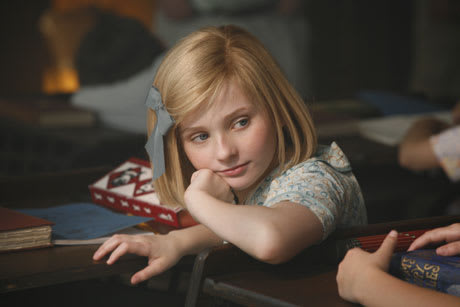Stepping away from the X-rated exploits of HBOs Tell Me You Love Me, Patricia Rozema has taken on some decidedly lighter material with Kit Kittredge, a depression era, G-rated Nancy Drew thats based on the popular "American Girl doll line. It seems logical that a movie based on a plush doll line of merchandise, and that professes "dress like your doll as a selling point, would be facile and saleable. However, the film features some guileless didactics with a heart-warming centre thats only occasionally contrived.
The film follows Kit Kittredge (Abigail Breslin) during the 30s depression after her father (Chris ODonnell) has left their home in search of work and her mother (Julia Ormond) has had to take borders into their home in order to make ends meet. Kits response to change and hardship is initially fearful, acknowledging social stigmas attached to the poor, such as selling eggs and wearing dresses made of chicken feed bags. But like all plucky heroines, she makes lemonade when life hands her a bag of manure.
To keep the younger demographic interested, there is an overlying mystery involving a faceless thief with an arm tattoo who travels from town to town, giving hobos a bad name. As a few of Kits central themes are acceptance and prevailing kindness, it doesnt take a great deal of genius to predict the road that the film will eventually travel.
Observations about a childs necessity to take on more adult roles in difficult times, in addition to the human tendency to ostracise and condemn those who are different in order to validate their own fragile existence, ameliorate the films schmaltzy tendency to be maudlin and banal. For every false scene where the soundtrack forces unearned sentiment, there are moments of truth, such as one where a young boy writes a fake letter to his mother from his absent father in order to give her hope and strength.
The colour, costumes and construction of Kit are all top-notch, giving gravity and credibility to the premise, while performances from the cast of seasoned thesps are uniformly effective, aside from Joan Cusack, whose over-the-top goofiness is both distracting and aggravating. The central mystery, along with Kits journalistic journey, is occasionally lost in a story that tries to cover too much ground, but comes together in a third act that ties things together satisfactorily, if unremarkably.
Despite some severe pacing issues, more bookish pre-teen girls should find a connection with the titular Kit and her relentless self-preservation and persevering optimism in hard times.
(Alliance)The film follows Kit Kittredge (Abigail Breslin) during the 30s depression after her father (Chris ODonnell) has left their home in search of work and her mother (Julia Ormond) has had to take borders into their home in order to make ends meet. Kits response to change and hardship is initially fearful, acknowledging social stigmas attached to the poor, such as selling eggs and wearing dresses made of chicken feed bags. But like all plucky heroines, she makes lemonade when life hands her a bag of manure.
To keep the younger demographic interested, there is an overlying mystery involving a faceless thief with an arm tattoo who travels from town to town, giving hobos a bad name. As a few of Kits central themes are acceptance and prevailing kindness, it doesnt take a great deal of genius to predict the road that the film will eventually travel.
Observations about a childs necessity to take on more adult roles in difficult times, in addition to the human tendency to ostracise and condemn those who are different in order to validate their own fragile existence, ameliorate the films schmaltzy tendency to be maudlin and banal. For every false scene where the soundtrack forces unearned sentiment, there are moments of truth, such as one where a young boy writes a fake letter to his mother from his absent father in order to give her hope and strength.
The colour, costumes and construction of Kit are all top-notch, giving gravity and credibility to the premise, while performances from the cast of seasoned thesps are uniformly effective, aside from Joan Cusack, whose over-the-top goofiness is both distracting and aggravating. The central mystery, along with Kits journalistic journey, is occasionally lost in a story that tries to cover too much ground, but comes together in a third act that ties things together satisfactorily, if unremarkably.
Despite some severe pacing issues, more bookish pre-teen girls should find a connection with the titular Kit and her relentless self-preservation and persevering optimism in hard times.
